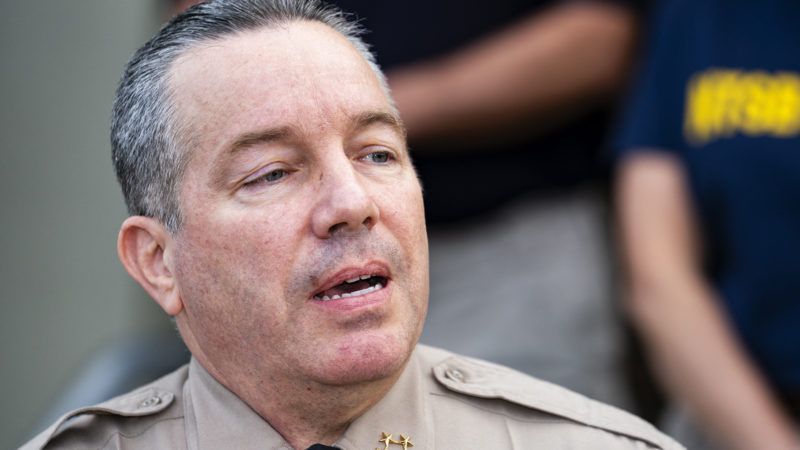Do Gun Dealers Count As 'Essential' Businesses That Can Stay Open Under COVID-19 Lockdowns?
Or is the Second Amendment suspended for the duration of the epidemic?

As local and state governments began to shut down "nonessential" businesses in response to the COVID-19 pandemic last week, firearm purchases soared. The National Shooting Sports Foundation, an industry group, reported that the number of FBI background checks for gun buyers on March 16 was four times as high as on the same date last year.
The anxious surge in firearm sales raises an obvious question: Do gun stores count as "essential" businesses that can continue to operate during lockdowns? Different states have answered that question differently, leading to lawsuits and some backtracking.
At least 10 states and the District of Columbia have issued broad orders shutting down businesses. Their definitions of "essential" businesses that are allowed to remain open vary. Illinois Gov. J.B. Pritzker, for example, exempted "firearm and ammunition suppliers and retailers for purposes of safety and security," while California Gov. Gavin Newsom initially did not.
Two days ago, Los Angeles County Sheriff Alex Villanueva announced that his deputies would be visiting local gun stores and ordering them to shut down. "We will be closing them," he told the Fox station in Los Angeles. "They are not an essential function. I'm a supporter of the Second Amendment. I'm a gun owner myself. But now you have the mixture of people that are not formerly gun owners, and you have a lot more people at home, and anytime you introduce a firearm in a home, from what I understand from CDC studies, it increases fourfold the chance that someone is gonna get shot."
Villanueva probably had in mind much-criticized research such as the 1993 New England Journal of Medicine study that reported a threefold increase in the risk of homicide for people who keep guns at home, or the 2009 American Journal of Public Health study that reported a more-than-fourfold increase in the risk of being shot. By leaping from correlation to causation, such studies ignore the ways in which people who keep guns for self-protection may differ from people who do not—in particular, their pre-existing risk of being shot or murdered.
It is odd, to say the least, for a self-proclaimed Second Amendment supporter to declare that it's reckless for anyone (except for police officers like himself) to exercise the constitutional right to armed self-defense. In any case, Villanueva's anti-gun operation has been suspended as Newsom reconsiders whether firearm retailers should be deemed essential.
Like Newsom, Pennsylvania Gov. Tom Wolf did not initially classify gun dealers as essential. But he reversed that position after the Firearms Policy Coalition (FPC) filed a lawsuit arguing that Wolf's closure order exceeded his legal powers and violated various constitutional provisions, including the right to arms guaranteed by the Second Amendment and Article I, Section 21 of Pennsylvania's constitution.
Last week the Pennsylvania Supreme Court rejected the FPC's application for extraordinary relief. But three justices—David Wecht, Christine Donohue, and Kevin Dougherty—strongly dissented.
"In light of the regulatory framework attending the sale and transfer of firearms," Wecht et al. noted, "the inability of licensed firearm dealers to conduct any physical operations amounts to a complete prohibition upon the retail sale of firearms—an activity in which the citizens of this Commonwealth recently have been engaging on a large scale, and one guaranteed by both the United States Constitution and the Constitution of this Commonwealth." Wolf's order, the dissenting justices said, "amounts to an absolute and indefinite prohibition upon the acquisition of firearms by the citizens of this Commonwealth." They added that "it is incumbent upon the Governor to make some manner of allowance for our citizens to continue to exercise this constitutional right."
Wolf responded by amending his list of "life-sustaining businesses" to include gun stores. The governor's office now says "firearms dealers may operate physical businesses on a limited basis to complete only the portions of a sale/transfer that must be conducted in-person under the law," provided the sales are arranged by appointment and comply with social distancing and sanitization requirements.
"We appreciate that the governor heard the voices of Justices Wecht, Donohue, and Dougherty and will now allow gun stores to remain open and serve the public," said Adam Kraut, the FPC's director of legal strategy. "The right and ability to protect yourself and your family, particularly in times of crisis, is the very definition of 'life-sustaining' and unquestionably protected by both the Second Amendment and the State's constitution."
Kraut's group is also challenging New Jersey Gov. Phil Murphy's business closure order, which includes gun stores and prompted the New Jersey State Police to shut down its background check website. "Defendants' acts of prohibiting the operation of retail firearms businesses without regard to their manner of operation and of foreclosing any ability to access the background check portal prohibit law-abiding individuals from purchasing firearms for the purpose of protecting themselves and their families (or for any other purpose)," says the FPC's federal lawsuit, which argues that Murphy is depriving New Jersey residents of their constitutional rights under color of law. "Independently and collectively, these acts stand as a perpetual bar on firearms ownership….State and local governments do not have the power to prohibit the keeping and bearing of arms, nor to close the channels of distribution by which people obtain firearms."
Among the other states that have imposed broad business closure orders, Ohio and Michigan have exempted gun dealers. New York, Massachusetts, and the District of Columbia have not. Minnesota's list of "critical businesses" says sales of "sporting goods" are not exempt; it does not mention firearms or ammunition specifically. Maryland has three lists of exempted businesses (here, here, and here). Gun dealers do not appear on any of them.


Show Comments (73)